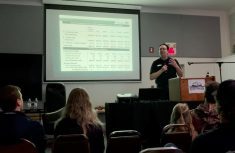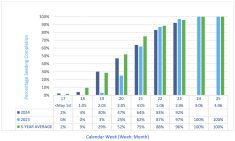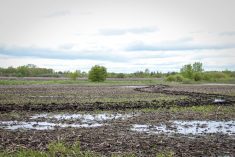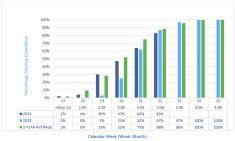Bill Campbell says he’s ready for spring — his combine just got back from its annual winter check-up.
The Minto-area farmer and president of the Keystone Agricultural Producers says he’s ready to finish last year’s harvest as soon as his fields are passable this spring.
That’s adding to what’s already going to be a short and stressful spring because when he spoke to the Co-operator April 14, snow still blanketed the fields in his area.

“I’m worried big time now,” Campbell said. “In our area it’s wet, extremely wet.”
He said just a day or two earlier he’d followed some elk tracks out across this field and walked out a ways to take stock of the situation.
“It’s wet and it’s muddy and it’s going to take a lot of drying,” he said. “And we’ve got no black dirt to help it; the only thing that’s black is the ruts.”
To the north Don Dewar, who farms with son Mark near Dauphin, says the situation in his area is a little better, but still daunting as the days tick away.
“Most people around Dauphin managed to get their crop off,” Dewar said April 14. “A few got half their anhydrous — the Dauphin Co-op says they’re half done, but that includes the Ste. Rose area, where there’s lighter land.”
It’s setting the stage for a spring that’s going to be even more of a hustle than usual, Dewar said, adding it’s going to be a seasonal start that’s a bit on the later side.

“There are years we’ve started somewhere around April 15 or 20,” Dewar said. “Obviously that’s not going to happen this year. Right now we’ve still got three or four inches of snow and -6 C is the high today. We’re two weeks away, and it’s going to be busy when it’s time to turn it on.”
Dewar says they’ve got one tractor that can seed and pull the cultivator to work in pre-plant products for crops like edible beans, which will be the most obvious bottleneck for their farm.
“That tractor is going to be putting in a lot of hours in a hurry,” he said.
Familiar picture
Anastasia Kubinec says she’s heard much the same story talking to farmers from across the province.
The manager of Crop Industry Development for the provincial Department of Agriculture is also involved with a multi-generation family operation near Holland.
The growers she’s spoken to report similar conditions as Campbell and Dewar — many have at least some crop still out and few got all their fall work done. But she noted anyone who’s farmed in Manitoba for a few years has encountered similar spring seasons.

“This does happen,” she said. “Every seven or eight years, we get a spring like this. We get a bit more snow, and with that comes a bit more rush and panic. But most farmers have a plan in place for when that does happen, and they’ll roll with what the season gives them.”
In particular she noted the equipment of today leaves farmers well positioned to cover many acres very quickly when they do get a break. Long gone are most 30-foot seeders, replaced by 60-, 80-, even 90-foot-wide units.
“If they can get 10 days that are good, it’s really remarkable how much seeding can get done,” she said.
She also said that the season isn’t particularly late yet, though no doubt there are plenty of farmers who’d love to already be in the field. An average start would typically be the last week of April through to the first week of May.
Read Also
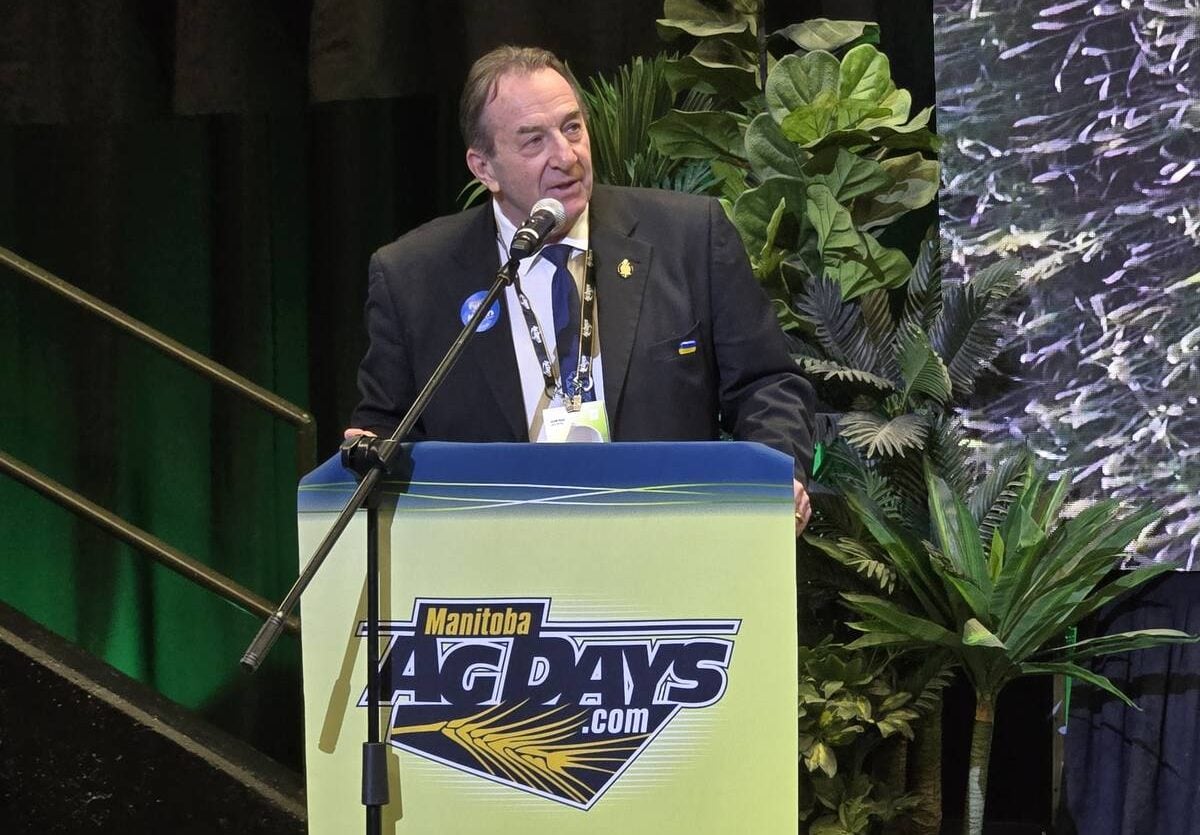
Manitoba crop insurance expands wildlife coverage, offers pilot programs
New crop insurance coverage is available to Manitoba farmers.
Some adjustments
With the COVID-19 pandemic in the headlines, farmers have had to make some adjustments to their operations.
Campbell says he’s been assured that he’ll be able to get the inputs he needs from his local farm supply outlet.
“I’m lucky that I have a good relationship with my input supplier,” Campbell said. “I don’t know exactly all the logistics they’ve needed to manage, but they’re a very good, reliable outfit and if I need a delivery, I’m pretty sure they can fulfil it.”
He says it’s likely he’ll be getting deliveries to the farm, and avoiding physically going in.
“My concern would be meeting people there, and all that part,” he said. “Other than that, we’ve got a really small labour force. It’s me, my wife and one other fellow.”
Dewar confirmed it would be mostly business as usual on their operation too, but they’re a bit more exposed because three members of the operation have spouses who work directly or indirectly in health care. He says they’re currently pondering how to disinfect equipment between operators. But otherwise it should be minor adjustments.
“We won’t be working on top of each other,” he said. “Everyone is being a little bit careful.”
Kubinec said that mirrors the sort of pragmatic changes she’s heard farmers are generally making.
“There are a lot of people thinking about this in the background — all producers and farm families,” Kubinec said.
One of the major themes she’s seen emerge repeatedly is having a continuity plan so that one person getting ill doesn’t derail the whole operation.
“What if the main farm ‘driver’ gets sick? What are we going to do then? It seems like every farm has one or two key people, they’re the ones with a plan set in mind,” she said.
She says that’s meant a bit more communications within farms to ensure more people can access and understand the full plan, which suppliers are providing what inputs and even speaking to lenders to make sure there’s a backup person with signing authority for the operation.
Unclear picture
Campbell and Dewar both said a busy spring with a few unknowns thrown in isn’t anything new to them. Farmers will take what Mother Nature gives them for weather and make the usual adjustments as necessary. That’s just business as usual.
But Campbell adds that what his mind keeps coming back to is just how unsettled everything is away from the farm, as the globe lives through an unprecedented pandemic-driven economic slowdown and all the resulting consequences.
What is the landscape and world going to look like when I harvest?” Campbell asked. “Who’s going to want what I produce, what are they going to want, and can I do it profitably? That’s a big concern to me.”








